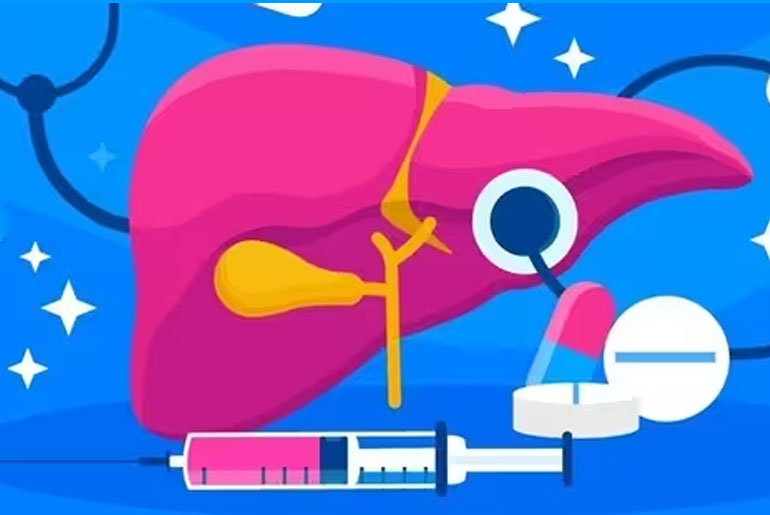During the rainy season, a significant rise in gastrointestinal issues, particularly liver diseases like hepatitis A and E, is observed due to factors such as contaminated water and food. The monsoon conditions can lead to water and food sources becoming contaminated, increasing the risk of viral infections affecting the liver. Hepatitis A and E are common during this period, and individuals must adopt preventive measures to safeguard their liver health and overall well-being.
One of the primary causes of this surge in liver diseases is the consumption of unclean or contaminated water and food. Rainwater can lead to waterlogging and contamination of water sources, facilitating the spread of disease-causing microbes. Additionally, poor hygiene practices, such as inadequate handwashing and consumption of improperly washed fruits and vegetables, contribute to the transmission of these viruses. Street food, often prepared under unsanitary conditions and with contaminated water, further exacerbates the risk of infection. Person-to-person transmission in crowded areas also plays a role in the spread of hepatitis A and E.
To address and prevent these issues, individuals are strongly advised to take precautionary measures. This includes maintaining proper hygiene practices, such as frequent handwashing with soap and clean water, especially before eating or touching the face. Safe water and food consumption is crucial, with an emphasis on consuming only properly cooked food and boiled or purified water. Avoiding unclean raw food and vegetables, as well as minimizing the consumption of street food, can significantly reduce the risk of exposure to contaminated sources.
Vaccination for hepatitis A is a proactive step individuals can take to protect themselves against the virus. Consulting a healthcare professional for guidance on vaccination is recommended. Furthermore, in the event of infection, individuals should adhere to medical advice and take prescribed medications. Rest and proper hydration are essential during recovery. If symptoms worsen or complications arise, seeking medical attention is crucial to ensure proper monitoring and supportive care.
The monsoon season sees a heightened incidence of hepatitis A and E due to contaminated water and food sources. Taking preventive measures, such as practicing good hygiene, consuming safe water and food, considering vaccination, and following medical guidance, can effectively reduce the risk of contracting these viral infections. By being vigilant and proactive, individuals can protect their liver health and overall well-being during the rainy season.
Exclusive Interview with Dr. Harshad Joshi, Renowned Consultant Gastroenterologist at Apollo Spectra, Mumbai: Unveiling Valuable Insight, “Monsoon is synonymous with a host of gastrointestinal problems including hepatitis infection. From children to adults to senior citizens, anyone can suffer from liver problems. “Contamination during rainy seasons leads to stomach infections. The common stomach infections are dysentery and diarrhea causing stomach pain, loose motions, and nausea. Typhoid is a serious bacterial infection causing High fever, stomach pain, nausea, and vomiting. Hepatitis A and Jaundice can also give one a tough time. Hepatitis A means inflammation (swelling) of the liver. Poor sanitation, and water and food contamination raise the chances of dysfunction. One will suffer from jaundice leading to yellow eyes, yellow urine, white stools and stomach pain.”
Dr Vikas Pandey, Gastroenterologist at Zynova Shalby Hospital, highlighted, “Liver infections or hepatitis cases are on the rise during monsoon owing to A and E viruses. One gets hepatitis A or E because of contaminated food or water or from close contact with an infected person. Eating food available on the streets or opting for pre-cut fruits that may be washed with contaminated water, drinking juices, and having pani puris, gola, sherbet made from contaminated water or ice, unclean raw food, and vegetables can make one prone to hepatitis. In 2021, 110 people suffering from liver and gastrointestinal diseases were treated during monsoon. In 2022, the number of patients increased to 326 patients. This year, when the rainy season has just started, 220 patients suffering from liver problems and gastrointestinal diseases have been found. Water intake is greatly reduced during monsoons. It increases liver and stomach-related disorders. So it is very important to drink enough water irrespective of the season.”
Revelations from Dr. Vikram Raut, Director of Liver Transplantation and HPB Surgery at Medicover Hospitals: Insights and Expertise, “Hepatitis A and E can take a toll on one’s overall well-being. It can steal one’s peace of mind as if left untreated, they can damage the liver. Hepatitis A and E presents as jaundice when the skin and the eyes turn yellow. One’s condition can worsen when he/she doesn’t seek timely treatment leading to acute liver failure and ultimately liver transplantation.”
Dr. Harshad Joshi’s Expert Insights: Treatment and Prevention Measures for Optimal Health, “The treatment will be based on symptoms and differ from one-person-to-another. Take the medication prescribed by the doctor only. Avoid eating raw food and vegetables or street food and boil the water before drinking. Juices and other drinks are a strict no-no as they may contain contaminated ice, do not eat pre-cut fruits available at roadside stalls, wash hands from time to time.”
Disclaimer:
The information contained in this article is for educational and informational purposes only and is not intended as a health advice. We would ask you to consult a qualified professional or medical expert to gain additional knowledge before you choose to consume any product or perform any exercise.








